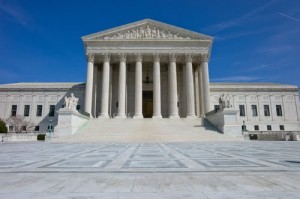In a 5-4 vote, the Supreme Court on Tuesday threw out a lawsuit challenging the US government’s warrantless surveillance powers on the grounds that the plaintiffs do not have “standing.”
 Justices Samuel Alito, Anthony Kennedy, Antonin Scalia, Clarence Thomas, and Chief Justice John Roberts concluded that the plaintiffs cannot sue the government for the 2008 expansion of the Foreign Intelligence Surveillance Act (FISA) because they can’t prove the law directly effects them.
Justices Samuel Alito, Anthony Kennedy, Antonin Scalia, Clarence Thomas, and Chief Justice John Roberts concluded that the plaintiffs cannot sue the government for the 2008 expansion of the Foreign Intelligence Surveillance Act (FISA) because they can’t prove the law directly effects them.
The FISA Amendments Act of 2008 authorized broad, warrantless surveillance of Americans’ international communications, checked only by a secretive Foreign Intelligence Surveillance Court that doesn’t make it’s activities and procedures available to the public.
Even though the government has acknowledged that the secretive program has exceeded its legal limits, violating Americans’ Fourth Amendment constitutional rights, the majority decision on Tuesday rejected the notion that a group of American lawyers, journalists and rights organizations have any standing to challenge it.
The problem is that the government refuses to disclose the details of the warrantless surveillance program. Therefore, using the logic of the majority opinion, no one can ever have standing to challenge the law, because whether they are directly affected by it is information that is classified.
The plaintiffs “have set forth no specific facts demonstrating that the communications of their foreign contacts will be targeted,” Alito wrote in the majority opinion.
But the minority, which included Justices Stephen Breyer, Ruth Bader Ginsburg, Sonia Sotomayor and Elena Kagan, disagreed.
“We need only assume that the government is doing its job (to find out about, and combat terrorism) in order to conclude that there is a high probability that the government will intercept at least some electronic communication to which at least some of the plaintiffs are party,” Breyer said. “The majority is wrong when it describes the harm threatened plaintiffs as “speculative,” Breyer said.


